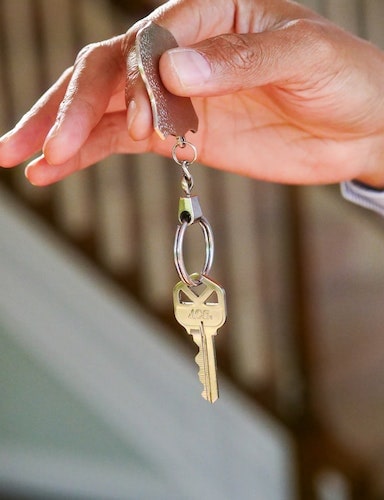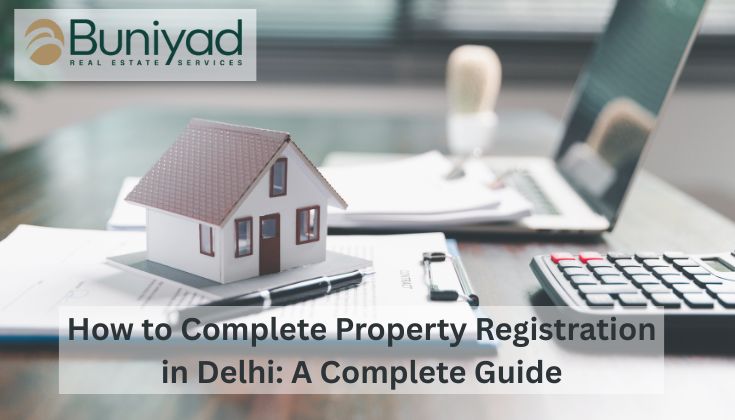
Register here and Avail the Best Offers!!
 +91-999 9111 100
+91-999 9111 100

 By Buniyad
By Buniyad 11/20/2025
Property registration is an important step in the property buying process, as it ensures legal ownership of the new buyer. Property registration in Delhi is a simple process, but it can sometimes feel daunting, especially to first-time homebuyers. This article aims at laying out a step-by-step guide to property registration in Delhi, things to keep in mind when getting the property registered, and if and when one should involve a property registration lawyer in the whole process of getting the property registered in Delhi in 2025. Read on.
When one buys a property, the transfer of ownership in all the property-related documents takes place. This includes numerous steps and is critical to ensure that the new owner’s name is reflected on the property papers. It proves your ownership and protects you from any fraudulent claims that may arise at a later stage. Further, the government has also made it mandatory to get the property registered under the Indian Registration Act, 1908. This makes registered documents admissible in the court of law if the need arises because of any legal complications regarding the property.
There are a few steps to follow to get the property registered in Delhi. It starts with document verification and moves on to stamp duty payment, scheduling an appointment, reaching the appropriate sub-registrar’s office on the day of the appointment for biometric verification, payment of registration fees, and finally collecting the receipt.
There are two websites one can visit to begin the formalities, such as paying the stamp duty and registration charges, uploading the documents, and booking an appointment. One is the Delhi Online Registration Information System (DORIS). The other one is Stock Holding Corporation of India Limited (SHCIL). It is a Central Record-keeping Agency (CRA) that helps not just with e-stamping but also with Demat Services and the like.
One must gather the key property related documents and personal IDs before scheduling an appointment. These include:
Once collected, the buyer can hire a property registration lawyer to verify the documents to check for any legal discrepancies.
Stamp duty is a mandatory charge collected by the state/UT government on all property transactions. The prevalent stamp duty charges in Delhi are as follows:
Stamp duty can either be paid online via the Delhi government’s e-stamping portal or offline through authorised banks.
You can use the online portal of the Delhi government to schedule an appointment for further formalities at the sub-registrar’s office. This step helps bypass the long queues you may find if you reach the office without a prior appointment.
Once you reach the sub-registrar’s office on the scheduled date and time with all the documents as mentioned in Step 1 above, the final property registration process will begin. Buyer(s), seller(s), and two witnesses are needed to be present in the office. Having a property registration lawyer helps here as they can guide you with formalities, ensuring all steps are followed correctly.
Biometric verification of both parties takes place at the sub-registrar’s office. A reading of the sales deed is then carried out in the presence of all parties.
Next up is payment of the registration fees. Separate from the stamp duty charges, home registry charges in Delhi are calculated at 1 percent of the property’s market value or transaction value – whichever is higher. One can pay these fees in advance along with the stamp duty charges or pay it here at the sub-registrar’s office. A pasting charge of Rs. 100 also needs to be paid here.
Once all these steps are followed through and all formalities are completed, the buyer gets an acknowledgement slip. The sales deed and other registered documents reflecting the new owner’s name are made available in a few days (approximately 15-30 days).
You can find a list of sub-registrar’s offices situated in various parts of Delhi by visiting the DORIS portal. Earlier, the parties were required to visit a specific sub-registrar’s office for the procedure, but since 2023, this has changed. The Delhi government introduced the ‘Anywhere Registration’ facility in 2023, letting the parties visit any sub-registrar’s office of their choice within the national capital. This facility was rolled out to ensure enhanced convenience for the parties.
The Delhi government has digitized the entire property registration process, making way for great convenience for all parties involved in the property registration process. For this, the number one step is to visit the official website, pay stamp duty online, book an appointment, scan the property documents and upload them in the desired format, pay the registration fee online, and you are done.
A property registration lawyer can make the whole property registration in Delhi process smooth, free from errors, and quick. They verify the property and check for any legal discrepancies. Lawyers also help in correctly calculating the stamp duty and registration charges. They also represent you at the sub-registrar’s office, ensuring the entire procedure gets completed in an efficient manner.
Legal updating of property ownership in the government’s records is a must to avoid legal complications such as title fraud and ownership disputes that may arise at a later stage. Get in touch with us at Buniyad Realty for end-to-end property transactions today!
Also Read: Understanding Property Valuation Methods Prevalent in India

If you have been reading about the […]

When two or more countries sign trade […]

Presented as usual on 1st February, 2026, […]

Once known only as a satellite township […]

Real estate centered around airports has always […]

Greater Noida has today grown into one […]

Touted as a major step in the […]

Once a satellite city to Delhi, Noida […]
Buniyad Blog is proudly powered by WordPress
Head Office
G-57/58 , Buniyad Chowk, Sector-18, Noida Uttar Pradesh
+91-999-9111-110Greater Noida
S.L. TOWER 1ST FLOOR, ALFA COMMERCIAL BELT, Noida Uttar Pradesh
+91-020-42040004South Delhi
A-32, First Floor, Feroz Gandhi Rd, Lajpat Nagar-II,New Delhi.
+91-11-41006000Gurugram
JMD REGENT SQUARE GF-11 M.G. ROAD,Gurugram 122001
+91-124-4313200